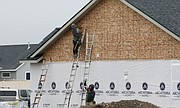Finding solutions to housing woes
The plight of scarce affordable housing in Idaho has the attention of Gov. Brad Little.
"The governor does recognize the issue in the state," Little's North Idaho field director Jake Garringer said Monday.
During an online meeting of the Regional Housing and Growth Issues Partnership Garringer said the governor's recommendation in the legislature is to allocate $50 million in American Rescue Plan Act funding to go toward workforce housing.
"The governor's idea is for the legislature to develop a program and a fund that the housing finance association would administer that would provide for gap finance issues," Garringer said. "His hope is that this will lead to 1,000 units across the state that would be geographically distributed to make sure that they don't all end up in the Treasure Valley."
He said hopefully, the legislature will go forward with that idea.
"Ultimately, it is in their hands to create that program," he said.
Members of the Regional Housing and and Growth Issues Partnership met to discuss what is in the works regarding Idaho's housing crisis as well as information in the Housing Availability and Affordability Study, which was released Thursday.
"Getting this was not a solutions-oriented project," said Maggie Lyons, interim executive director of the Panhandle Affordable Housing Alliance. "It was to assess for us, while we all know the challenges that we're facing, to have an independent assessment, real-time, through not just the data that was available, but also through stakeholder input in Kootenai County with respect to the challenges that we're facing."
The Regional Housing and and Growth Issues Partnership comprises officials from Kootenai County, the cities of Post Falls, Hayden and Rathdrum and the Kootenai Metropolitan Planning Organization. The partnership includes the original working group of regional planners along with elected representatives and administrators. The advisory group comprises representatives from organizations and community groups. Both groups may have additions as topics warrant.
Coeur d'Alene City Councilwoman Kiki Miller, who helped form the housing and growth issues partnership, said she has received information from group members and people from other communities on how to use ARPA funds for housing.
"Some of those dollars can be used to leverage other funding and other programs that deal with affordable housing," she said. "I know the city of Coeur d'Alene has not committed to what they're doing with all of theirs. And I know most of the cities are still in workshops regarding all of that. But I did want to let the advisory and working group know that affordable housing is one of the ARPA dollar conversations that's been going on."
Tenant-owned properties are another housing solution being discussed. In other communities, tenants are given opportunities to purchase the dwellings they're renting.
"There's other cities who have done this and and put forward that they have some sort of first right given to the tenant owners," Miller said. "If that owner decides they're going to sell that property, that they have a chance at it."
Group leaders will be presenting findings from the housing study in the next few months.
"We can't control the demand," Miller said. "We can't stop people from moving here, but we are going to have to start control(ing) what's available for them."
Info: rhgip.com



